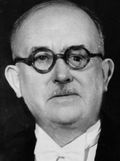 |
Jules-Vincent Auriol
b. 27 Aug 1884, Revel, Haute-Garonne
d. 1 Jan 1966, Paris |
| Title: |
Président de la République (President of the Republic) |
| Term: |
16 Jan 1947 - 16 Jan 1954 |
| Chronology: |
16 Jan 1947, elected, joint session of the Parlement (styled Congrès), salle du Congrès, Palais de Versailles [1] |
|
16 Jan 1947,
assumed the functions of office, public ceremony, salon de la présidence du Congrès, Palais de Versailles, Versailles [2] |
|
16 Jan 1954, expiration of term |
| Biography: |
| Born in the family of a baker; at the age of three, he lost his left eye while playing with a toy gun; attended a Roman Catholic primary school run by the Society of Saint Vincent de Paul at Revel (1889-1896); continued his education at the Catholic collège of Revel (1896-1902), earning a bachelor's degree; studied law at the University of Toulouse (1902-1905); president of the General Association of Students in Toulouse (1904); graduated with a law degree (licence en droit) in 1905; was admitted to the bar and worked as a lawyer in Toulouse (1905-1914); journalist (1909); general secretary of the Association of Journalists in Toulouse (1910); elected to the Chambre des députés (Chamber of Deputies) on the ticket of the Socialist Party (Section Française de l'Internationale Ouvrière, SFIO), representing the département of Haute-Garonne (1914-1940); served as president of the finance committee of the Chamber of Deputies (1924-1925); elected mayor of Muret (1925-1946); councilor general of the canton of Carbonne (1928-1946); was appointed minister of finances (4 Jun 1936 - 22 Jun 1937) in the cabinet of Léon Blum; minister of justice (22 Jun 1937 - 18 Jan 1938); minister for coordination of ministerial services (13 Mar 1938 - 10 Apr 1938); voted against the transfer of state power to Marshal Philippe Pétain (10 Jul 1940); imprisoned by the Vichy government at Pellevoisin (1940-1941); released and placed under house arrest (1941-1942); escaped and joined the Résistance in the south of France (1942-1943); moved to London and then to Algeria where he became a member of the Assemblée consultative provisoire (Provisional Consultative Assembly, 1943-1945); elected a member of the first (1945-1946) and second (1946) Assemblée nationale constituante (Constituent National Assembly), representing Haute-Garonne; minister of state (21 Nov 1945 - 26 Jan 1946) in the Provisional Government of Charles de Gaulle; served as President of the Constituent National Assembly (31 Jan 1946 - 27 Apr 1946, 14 Jun 1946 - 5 Oct 1946); elected to the Assemblée nationale (National Assembly) (1946-1947) as a deputy for the département of Haute-Garonne; elected President of the National Assembly (3 Dec 1946 - 28 Dec 1946, 14 Jan 1947 - 27 Jan 1947); elected President of the Republic (16 Jan 1947), first head of state of the Quatrième République (Fourth Republic); pursued conciliatory policy; suffered criticism as a result of economic and political crisis, war in Indochina; president of the UN International Conference against racial discrimination and honorary president of the World Federation of War Veterans; member of the Conseil constitutionnel (Constitutional Council) in 1959-1962. |
| Biographical sources: "Vincent Auriol: le Président citoyen, 1884-1966", by Éric Ghebali (Paris: B. Grasset, 1998). |
| Elections: |
| Candidate |
Vote (16 Jan 1947) |
| votes cast |
883 |
| blank/invalid |
0 |
| valid votes |
883 |
| absolute majority |
442 |
| Jules-Vincent Auriol |
452 |
| Jean-Jules-Marie-Auguste Champetier de Ribes |
242 |
| Jules-Théophile Gasser |
122 |
| Michel-William-Benjamin Clemenceau |
60 |
| scattered |
7 |
|
| Source of electoral results: JORF - Débats parlementaires, No. 2, 17 Jan 1947, pp. 2-4. |
| |
| [1] |
JORF - Débats parlementaires, No. 2, 17 Jan 1947, pp. 1-4. |
| [2] |
JORF - Lois et décrets, No. 15, 17 Jan 1947, pp. 589-590; Le Monde, No. 641, 18 Jan 1947, p. 3. |
|
Image: photograph of Jules-Vincent Auriol. |

